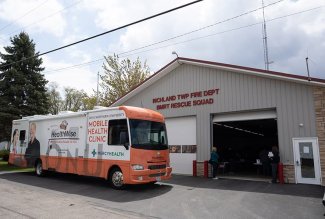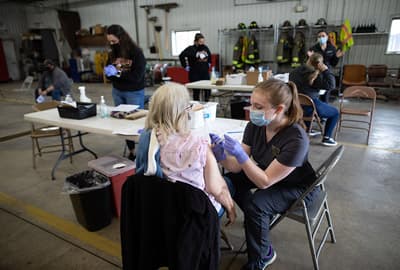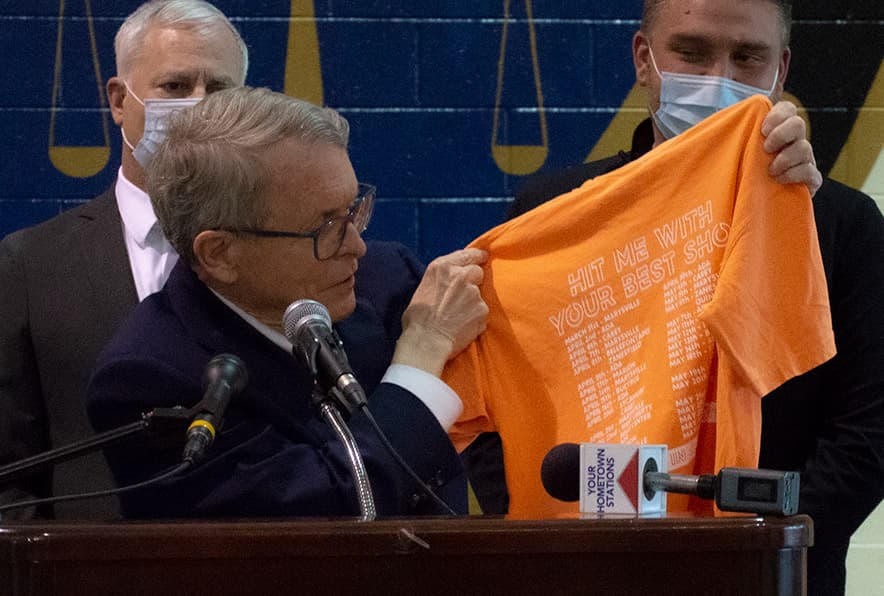
Students on the front lines of Ohio’s race to end the pandemic share their stories
Six counties. Sixty days. More than 2,300 miles traveled. Thousands of Ohioans vaccinated against COVID-19, all thanks to the Ohio Northern University and the state of Ohio’s mass vaccination program.
When Governor Mike DeWine, JD ’72, asked ONU to join the effort to provide safe, effective vaccinations to the state in March, he did so with an eye toward the underserved rural populations in our region. Rural communities are often in what are known as “medical deserts,” populated regions more than 60 minutes away from the nearest acute-care hospital. In many cases, these communities are also lacking in easily accessible primary care physicians and even dentists. In fact, the nearest health care professional is usually a pharmacist, something ONU’s Raabe College of Pharmacy has paid particular attention to over the years, and why the University invested in a mobile health clinic back in 2017.
 Before COVID-19, the mobile clinic was primarily used for outreach initiatives, fall flu shot clinics, and for remote health and wellness assessments. When the pandemic hit, the clinic became the nerve center for ONU’s on-campus testing program and its vaccination efforts across six counties. It contains two medical-grade refrigerators and a freezer to store the vaccine doses, and a secure internet connection to manage data. Regardless of its use, one thing remains constant: the high-impact, real-world experience it affords students.
Before COVID-19, the mobile clinic was primarily used for outreach initiatives, fall flu shot clinics, and for remote health and wellness assessments. When the pandemic hit, the clinic became the nerve center for ONU’s on-campus testing program and its vaccination efforts across six counties. It contains two medical-grade refrigerators and a freezer to store the vaccine doses, and a secure internet connection to manage data. Regardless of its use, one thing remains constant: the high-impact, real-world experience it affords students.
“Rural health care was not a topic that I was exposed to during any of my other college visits. It’s one of those things that makes ONU so unique,” says fifth-year pharmacy student Claire Witschger. “Serving rural communities and underserved populations helps me become a better pharmacist for a diverse patient population. ONU has given me the tools to succeed in my future.”
Witschger is one of 10 student interns ONU HealthWise hired in spring 2021 to assist with on-campus testing. When the Ohio Athletic Conference resumed intercollegiate athletics for the winter and spring seasons, it did so with the stipulation that athletes would be tested with greater frequency than regular students—up to three times per week. After administering just north of 3,000 tests in the fall, the expectation for spring was to be able to administer 10,000 tests. The testing program provided the HealthWise interns with an unprecedented level of hands-on experience, so when ONU became a state partner for vaccinations, the students were ready to hit the ground running.
The logistics of a successful mass vaccination clinic can be daunting, and much of the work was done by the interns. They scheduled appointments, cross referenced patients against Ohio’s ImpactSIIS vaccine registry to make sure they had not received the vaccine elsewhere, administered vaccinations, monitored post-vaccination patients, and also completed the billing and documentation processes required by state law.
“I guess we are kind of the behind-the-scenes crew,” says HealthWise intern and fifth-year pharmacy student Alexander Nixon. “Between the testing and now this, the 10 of us have been very busy this semester, but we’ve also gotten a tremendous amount of experience. It’s a great resume booster, but really the satisfaction comes from just being able to help a community that has helped us the past five years.”
 The ONU vaccination tour, as the students took to calling it—they even had T-shirts printed with all the locations and dates like a rock concert memento—began on March 31 and continued through May. During that time the ONU HealthWise Mobile Clinic traveled to sites in Logan, Union, Marion, Crawford and Wyandot counties, and hosted the Hardin County clinic on ONU’s campus in the ONU Sports Center Field House. The tour was temporarily halted when the CDC paused the use of the Johnson & Johnson single dose vaccine—which ONU was provided for the clinics— after fears of blood clots, but the University was quickly able to source the two-dose Moderna vaccine to continue its work.
The ONU vaccination tour, as the students took to calling it—they even had T-shirts printed with all the locations and dates like a rock concert memento—began on March 31 and continued through May. During that time the ONU HealthWise Mobile Clinic traveled to sites in Logan, Union, Marion, Crawford and Wyandot counties, and hosted the Hardin County clinic on ONU’s campus in the ONU Sports Center Field House. The tour was temporarily halted when the CDC paused the use of the Johnson & Johnson single dose vaccine—which ONU was provided for the clinics— after fears of blood clots, but the University was quickly able to source the two-dose Moderna vaccine to continue its work.
“Being selected as an Ohio Department of Health-sponsored clinic indicates that our efforts in the rural community are reaching our patients, and that different people/organizations in the state realize that too,” says Witschger. “I think the quick mobilization of the vaccine efforts also goes to show the kind of professors and employees that we have on our team. Seeing professors lecture and then go to a vaccine clinic 10 minutes later to help administer vaccines says a lot about their commitment to the community but also our education.”
If anyone knows and appreciates the work of ONU and the Raabe College of Pharmacy, it’s Ohio Governor and Polar Bear alumnus DeWine. He even made a surprise visit at the first Hardin County vaccination clinic on April 2 to raise awareness of the program. That day, more than 500 people rolled up their sleeves to do their part to end the pandemic, and to date more than 40 percent of the state’s residents have received at least one dose.
Still, there is much more work to be done and pushing back against disinformation regarding the safety of the vaccines is a big part of that. According to Nixon, the questions he’s hearing from patients aren’t about the safety or efficacy of the vaccine, but about the side effects.
“The vaccination efforts, both with COVID and even the flu shots last fall, are very popular programs. There would already be a line formed when we got to our locations last year to administer flu shots,” he says. “It’s very heartwarming to see the communities embrace the vaccine. One thing that stands out is how many people I’ve met that said they had COVID and are getting vaccinated so they don’t get it again. I’ve got to imagine it wasn’t a very pleasant experience.”